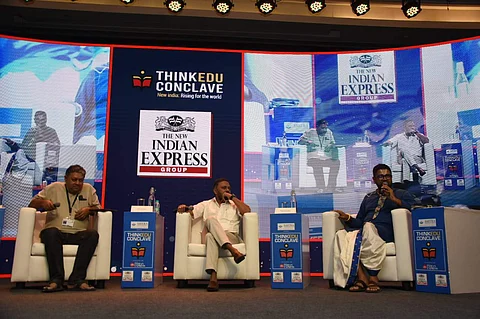

Scholar and public speaker Dushyanth Sridhar, and analyst and history commentator Badri Seshadri, discussed the Indian education model and the shifting knowledge paradigm at the 11th edition of The New Indian Express' ThinkEdu Conclave 2023 in Chennai on Thursday, February 9.
Sridhar stated that the Indian education model has three key parameters: an integrated approach to understanding and disseminating knowledge (such as the combination of poetry, science, and mathematics in the due course of singing), a logical approach, and the Guru-shishya system, as demonstrated in the story of Ramayana.
Read also : India is an aspirational country now: Sunil Ambekar
However, Seshadri expressed a differing viewpoint, stating that some historical events cannot be seen with the available evidence and that he prefers not to search for it as it is based on faith. He expressed respect for those who have faith in such events.
In contrast, Sridhar stated that there is proof in ancient India, citing an inscription from 1371 on the eastern wall of Srirangam which mentions the return of a deity and the poet's lifetime, as well as several other pieces of evidence from Sirungeri. He emphasised that learning from the past is not just based on faith, but is a moment to cherish, and that concepts mentioned in scripture can be stripped of extra elements to relate to science.
Regarding the current Indian education system, Seshadri stated, "I have many disagreements and problems with the current education system. In ancient times, there were more teachers. It has become an institution centre. The teacher chose what to teach and what to impart to a particular student. This is not possible today. Now, it is uniformly spread across teachers and we only talk about higher education systems."
He added, "For example, in a place like the United States, there are many written records available. I understand what happened during that period of time. Today, in US universities, the laboratory is quite autonomous. You can even write to the professor and get admitted to a particular institution, but that is not the case here. We cannot do that."
